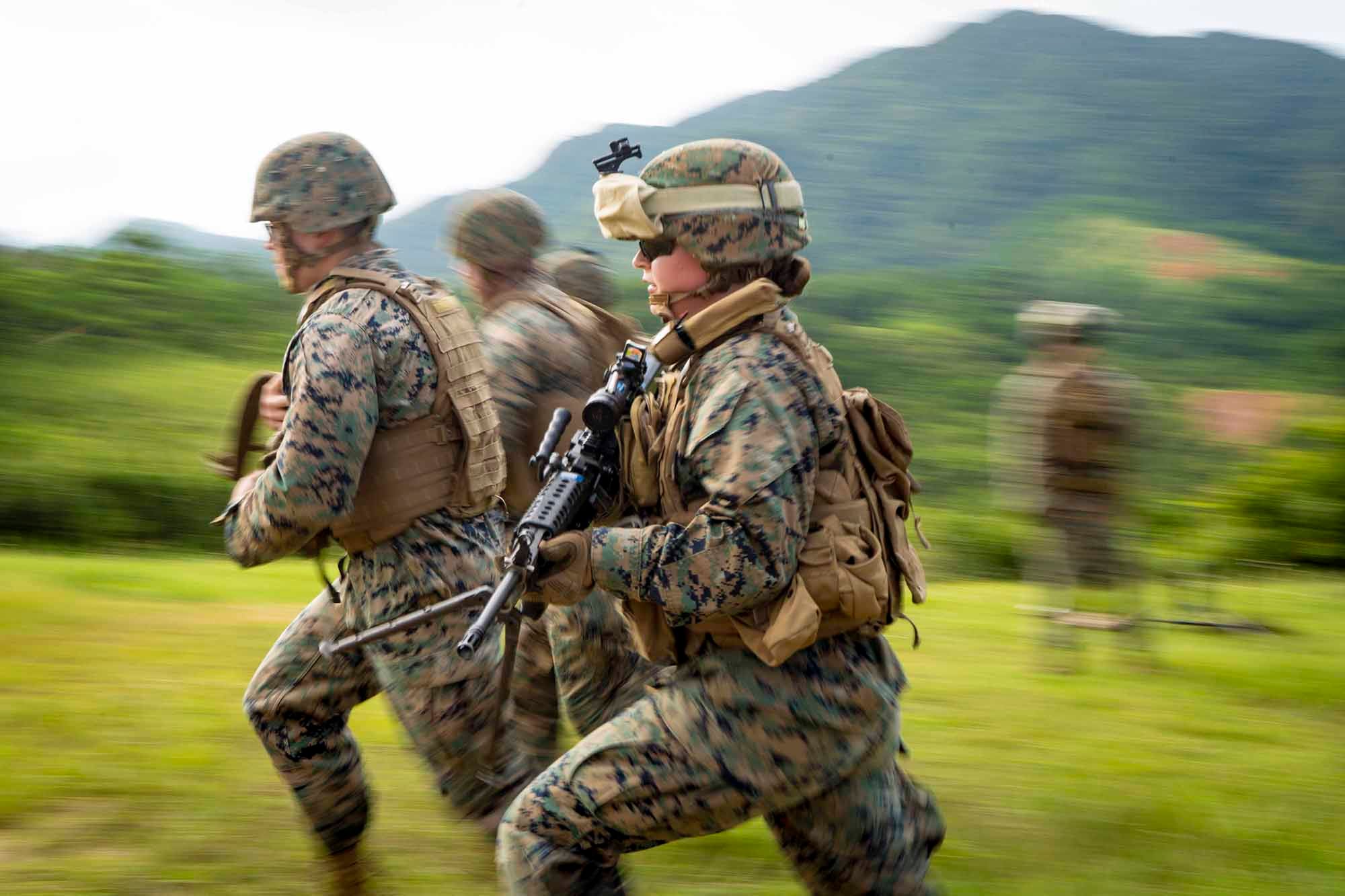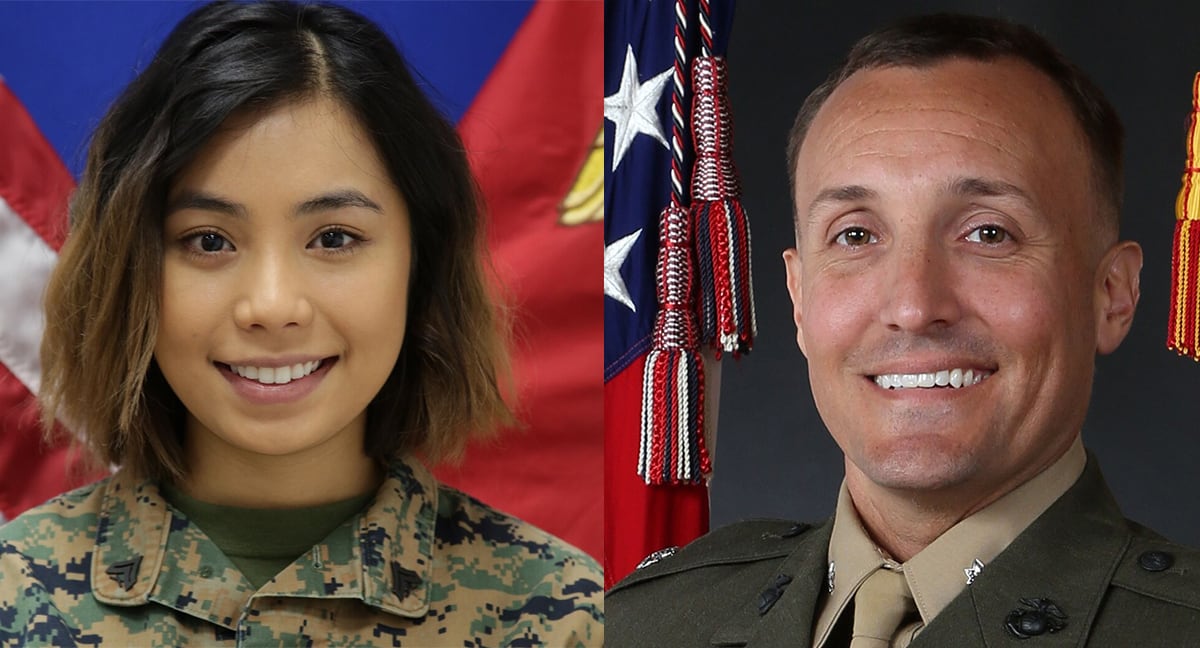On Thanksgiving Day 2007, Cathy Scheller was busy making dinner, fueled by the nervous energy of a mother worrying about her child’s safety.
Her son, Stuart Scheller Jr. ― then a first lieutenant with 1st Battalion, 8th Marine Regiment ― was deployed to Ramadi, Iraq, and there had just been an attack in the city.
Convinced that at any moment uniformed Marines might appear to deliver news no parent ever wants to hear, she paced between the front door and the kitchen for hours.
“I was just crying, and I’m just looking out the window,” she told Marine Corps Times in an exclusive phone interview in October. “And the phone doesn’t ring, and the phone doesn’t ring, and the phone doesn’t ring.”
Around 8 p.m., the phone finally rang.
On the other end was her son, Stuart, letting her know he was fine and wishing her a happy Thanksgiving. He had waited until all his Marines had been given the chance to call their families first.
“He said, ‘We only have one [satellite] phone,’” Cathy Scheller said. “He could have called us first. But it wasn’t the right thing to do.”
To Cathy Scheller and her husband, Stuart Scheller Sr., this is the kind of man and Marine her son, Lt. Col. Stuart Scheller Jr., was and still is today: A Marine who leads from the front and puts his Marines first.
It made his recent Marine Corps imprisonment and subsequent court-martial, in her words, “heartbreaking.”
To some, Lt. Col. Stuart Scheller bravely and publicly spoke the words that other Marines were thinking. To others, he was a Marine leader gone rogue, inappropriately speaking out of line about senior military officials and on the edge of a mental health breakdown.
The infantry Marine lieutenant colonel made waves in August when he posted a now-viral video shortly after news broke that 13 service members, including 11 Marines, were killed in a suicide bombing at Hamid Karzai International Airport in Kabul amid the U.S. withdrawal from the country.
In the video, while in uniform, Lt. Col. Stuart Scheller called for accountability from senior leadership over the nature, and what he called failures, of the U.S. withdrawal from Afghanistan.
His video immediately went viral and led to him being fired from his position as the battalion commander of Advanced Infantry Training Battalion at the School of Infantry–East at Camp Lejeune, North Carolina.
Despite that punishment, Lt. Col. Stuart Scheller, a combat veteran with multiple deployments to Iraq and Afghanistan, posted several more videos and written social media statements criticizing Marine Corps leadership. Additionally, he called for accountability from several presidents and generals who had overseen the war in Afghanistan during the past two decades.
Following these criticisms and breaking a gag order from the Corps, Scheller was sent to the brig in Camp Lejeune, North Carolina, on Sept. 27, where he remained until a plea deal between his legal defense team and the Marine Corps eight days later secured his release.
After his brig imprisonment he was charged, and later pleaded guilty, to six violations of the Uniform Code of Military Justice: Article 88 (contempt toward officials), Article 89 (disrespect toward superior commissioned officers), Article 90 (willfully disobeying a superior commissioned officer), Article 92 (dereliction in the performance of duties), Article 92 (failure to obey an order or regulation) and 27 specifications of Article 133 (conduct unbecoming an officer and a gentleman).
RELATED

The way the Marine Corps handled their son’s situation is a memory the Scheller family says they cannot forget. It is motivating them to speak publicly.
“I have been so proud of the Marines and so proud of Stu’s service, and I still am,” Cathy Scheller told Marine Corps Times. “And it this has just broken my heart. I can never look at [the Marine Corps] the same.”
While the Marine Corps has agreed to accept Lt. Col. Stuart Scheller’s resignation from the service as part of a plea deal made before his court-martial, no end date has been set.
It could be weeks, months or even years before he can leave the Marines, according to the Schellers, as his contract still has three years remaining.
Until then, according to Stuart Scheller Sr., Lt. Col. Stuart Scheller has been ordered to show up for work each day and remains under a gag order.
“At this point, I just want him to part ways and be safe because I don’t feel he’s safe there anymore,” Cathy Scheller said.
Locked up as a ‘flight risk’
Even though Lt. Col. Stuart Scheller’s command had ordered him to take a mental health evaluation following his social media outbursts, Stuart Scheller Sr. argued that the Marine Corps “couldn’t have cared less” about his son’s well-being.
In the eyes of the parents, the Marine Corps was hoping that their son would “just go away” and didn’t have serious care for his health or welfare.
“At no point did they try and help him through this,” Stuart Scheller Sr. told Marine Corps Times in the exclusive October interview. “So, that in my book is the exact opposite of what a leader should do.”
The Marine Corps did not comment when asked for a response.
Lt. Col. Stuart Scheller’s brig confinement was an example of this, his family said. He had been locked up as “flight risk,” the Scheller family and defense team asserted at the time, and multiple news outlets reported.
When asked about the rationale for the eight-day confinement, the Marine Corps stated Lt. Col. Stuart Scheller had remained behind bars “pursuant to [Rules for Courts-Martial] 305(h).2.B.”
This rule states if the commander of the Marine being court-martialed finds “reasonable grounds” that a prisoner committed an offense triable by court-martial and will not appear, or “will engage in serious criminal misconduct,” then confinement remains justified.
RELATED

One of Scheller’s videos said that he was in the woods in an abandoned school bus. To some, this was evidence of a flight risk.
However, his parents say that’s not true.
The school bus was on a small farm that Lt. Col. Stuart Scheller owns in North Carolina, according to his mother. It’s a place where he occasionally would informally host Marines.
The buses, according to Cathy Scheller, have been used for shelter following days and evenings of talks about war, combat stress and suicide.
“He cared about his Marines,” Cathy Scheller said. “He wanted them to get out and not commit suicide and be successful.”
The charges against Lt. Col. Stuart Scheller, which he uniformly pleaded guilty to, carried no potential for brig time post-conviction, as Marine Corps Times previously reported.
According to Stuart Scheller Sr., the assertion that his son was a flight risk is “ridiculous.”
“He showed up for work every day,” said Stuart Scheller Sr. “I have watched in the front row [for] the last two months of a grade five officer and how he was treated. One with an impeccable record, and I consider that the worst display of management and leadership I’ve ever seen.”
One of the charges Lt. Col. Stuart Scheller pleaded guilty to was Article 88 of the UCMJ, which criminalizes “contemptuous words” directed against certain civilian leaders.
RELATED

Scheller’s conviction appears to be only the second known court-martial for Article 88 since the UCMJ was adopted in 1950. During the Vietnam War, an Army lieutenant was convicted of violating Article 88 after carrying a sign calling then-President Lyndon B. Johnson a fascist, Marine Corps Times previously reported.
Additionally, a public leak of confidential documents regarding the lieutenant colonel’s records to the press before his trial prompted “outrage” from his father.
Just days before Scheller’s scheduled Oct. 14 court-martial, the military news outlet Task & Purpose published a story based on trial documents leaked by an anonymous source.
In those files, according to Task & Purpose, were notes from the Marine Corps command investigation into Lt. Col. Stuart Scheller, including a conversation with an unnamed officer that alleged he had called “for the use of violence” and “revolution.”
“They went on to try and paint him as an extremist,” Stuart Scheller Sr. told Marine Corps Times. “And if they could have charged him with anything in that space, they would have.”
In the father’s opinion, the leak was deliberately designed to discredit his son’s service record and reputation.
“[The judge] said his 27 years he has never seen a Marine come in for a court-martial with the exemplary record that Stuart had,” Cathy Scheller said.
The leak also prompted the ire of that military judge, Col. Glen Hines, who presided at Lt. Col. Stuart Scheller’s court-martial.
During the trial, Hines described the leak, along with the pretrial confinement, as raising the “specter of unlawful command influence,” Marine Corps Times previously reported.
Hines also referred to it as “unfair” and possibly “illegal.”
“[Judge Hines] said he would expect the prosecution and the Marine Corps to do an investigation,” Stuart Scheller Sr. said. “And that the person or persons responsible for the leaked documents he would see back in court.”
In an Oct. 29 email, a Marine Corps spokesperson acknowledged that an investigation into a leak is “ongoing” but that any further comment on the investigation is “inappropriate.”
The court absence of the senior officers who had charged Lt. Col. Stuart Scheller was the ultimate insult to the Scheller family, who said their son took ownership by pleading guilty to all charges.
RELATED

“I was very surprised that neither of them had the courage to come to court,” said Stuart Scheller Sr.
But according to the Marine Corps, that is protocol.
“It would be highly unusual for the commander of any Accused to attend a court-martial hearing out of an abundance of caution regarding even the appearance that the commander sought to improperly influence the case,” Marine spokesman Capt. Sam Stephenson told Marine Corps Times on Oct. 29.
Lt. Col. Stuart Scheller’s commanding officer and the commanding general of Camp Lejeune, North Carolina, were not present during the trial, according to the Marine Corps.
‘This is as good a man as you want’
The events of the past two months stand in contrast to Stuart Scheller Sr.’s leadership philosophy, which is one he says he passed on to his lieutenant colonel son.
While Stuart Scheller Sr. did not serve in the military, he has worked at the executive level in the health care industry for nearly 40 years. That includes spending more than the past 20 years running a health care consulting business, where he provides executive coaching and leadership counseling.
That philosophy was grounded in “managing down to your people and lifting them up,” while helping them “grow” and “improve,” according to Stuart Scheller Sr.
“Leaders lead by example, and the examples that I’ve seen in the last two months were awful,” he said.
RELATED

Despite their displeasure, the Schellers are satisfied with the result from the trial: a light sentence from Hines that docked one month’s pay, coupled with a stern admonishment of the prosecution.
The forfeiture of the pay was the only aspect the judge had power over, due to a pretrial agreement.
Prosecutors had requested that Lt. Col. Stuart Scheller forfeit $5,000 of pay a month for six months, in addition to a letter of reprimand.
He also wrote a letter of resignation under the agreement and will receive an honorable discharge or general under honorable conditions as part of the agreement, so long as Navy Secretary Carlos del Toro signs off on the character of the discharge, prosecutors said.
“The judge’s decision was very fair — he definitely considered all of the facts,” Tim Parlatore, Lt. Col. Stuart Scheller’s attorney, told Marine Corps Times after the trial. “I think that this is a good adjustment [to the prosecution’s recommended sentence], and so we’re very pleased with the result here.”
With Lt. Col. Stuart Scheller’s Marine Corps career all but over, his parents hope their son will be expeditiously discharged.
“This is as good a man as you want in the Marine Corps,” Cathy Scheller said. “That’s what is so heartbreaking.”
Military Times Staff Reporter Davis Winkie contributed to this report.
Editor’s note: This story has been updated to delete a sentence saying that Task & Purpose obtained or published Lt. Col. Stuart Scheller’s medical documents, including those about mental health.
James R. Webb is a rapid response reporter for Military Times. He served as a US Marine infantryman in Iraq. Additionally, he has worked as a Legislative Assistant in the US Senate and as an embedded photographer in Afghanistan.





